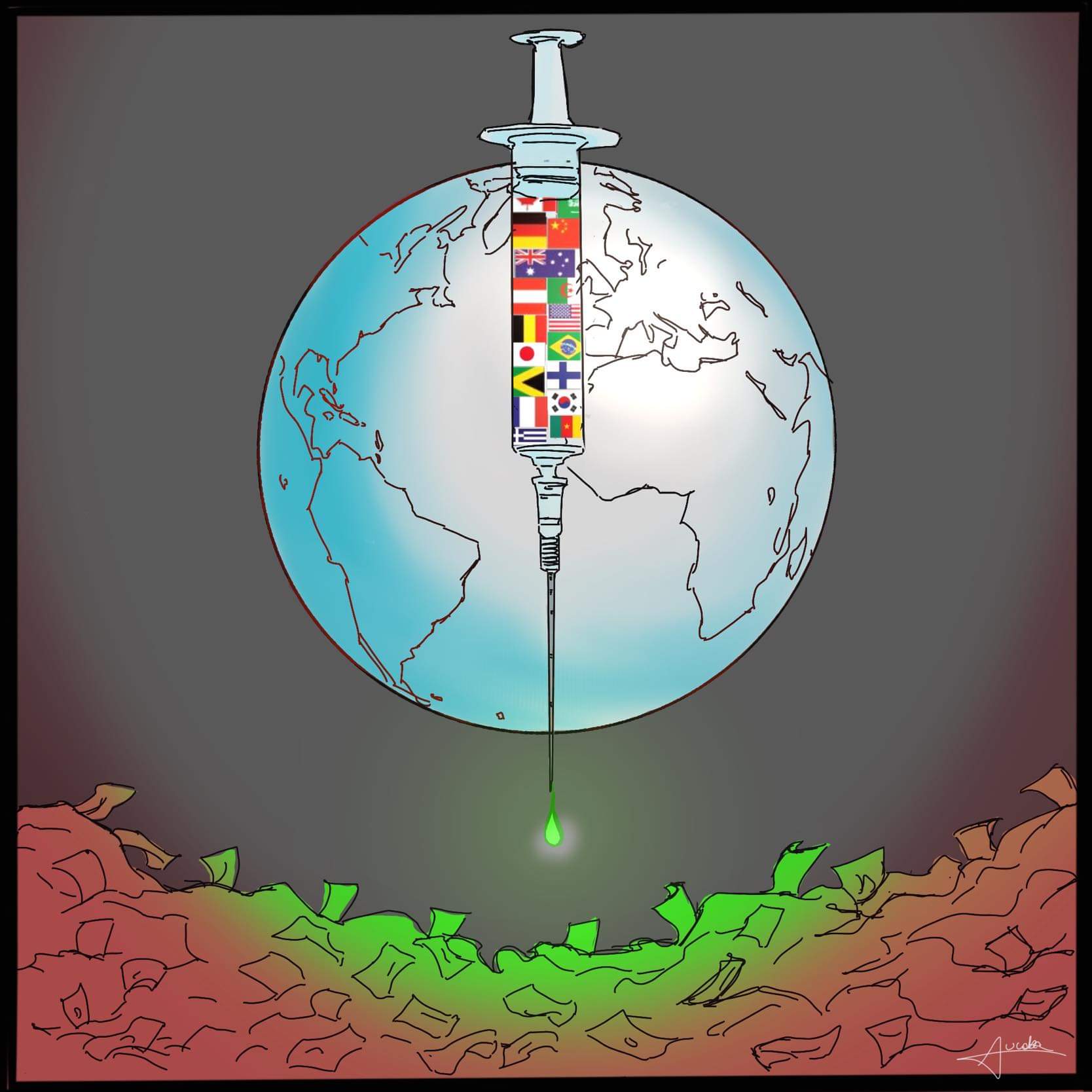Pfizer, AstraZeneca, Moderna, Johnson & Johnson, Spoutnik V… These are the names of the many vaccines against Covid-19 representing a great message of hope for humankind. Vaccination campaigns started as soon as possible in a lot of countries. Vaccines appear as the only way to get out of this pandemic and reach a normal life again. But how do those campaigns evolve around the world ?
A very strict protocol controles drug production. Covid-19 vaccines are not escaping this regulation, which prevents the human population of potential drug danger or failure. Drugs must pass all the usual tests, which normally take about ten years for a vaccine, and their commercialisation must be authorized by health agencies (Food and Drug Administration in the United-States, and the European drug agency). The rush for immunity fighting Covid-19 pandemic implies to speed the protocol : vaccines are on the market and many have already been vaccinated.
The european struggle
The European Union plans to vaccinate around 70% of its population before summer 2021 but it is still an ambitious bet. On March 30th 2021, 30,905,538 people had received a first injection in the United Kingdom, where the vaccination campaign seems to be advancing quite fast. In Spain, almost 8,035,160 persons have been vaccinated and in France, about 2,851,057. In Europe, many think that the campaign isn’t fast enough. This claim comes with the decision of many countries to stop the distribution and use of the AstraZeneca vaccine because of a thrombosis risk, reopening the debate around the contraceptive pill (causing about 2.500 accidents and 20 deaths per year in France, way more than the vaccine). This restriction, even if it was brief, will cost around 123 million euros to the European Union. Indeed, despite the thrombosis risk, the AstrazEneca vaccine, produced in the United Kingdom, does not respect its delivery time in Europe. London and Brussels hope to come to an agreement through delivery contracts or law enforcement dealing with vaccine export. On the other hand, Denmark, Greece and Italy decided to stop using the vaccine. This pandemic reveals new geopolitical stakes based on healthcare.
Safety before profits ?
As Europe struggles, the United States experiences an economic rebound thanks to a highly productive vaccination campaign. There are three authorized vaccines coming from the USA and, at first, they all have been reserved in priority for their population. Pfizer, Moderna, Johnson & Johnson, the US government chose to vaccinate its own population as much as possible rather than exporting. Ben Truman, a spokesman from Vermont’s department of public health, reported to Reuters that “The increasing allotment of vaccines by the Biden administration is making it possible for us to speed up our vaccination timetable”. Priority groups are almost all vaccinated and many states plan to open vaccination to others.
However, Le Monde points out that this new geopolitics related to the pandemic could remind us of the Cold War. Indeed, the European, Russian, Chinese and US health forces intend to extend their economic development by exporting their shots. Russia and China are willing to export as many as possible. China counts several orders from South Asia (Cambodia, Pakistani, Birmania) or Africa (Egypt, Equatorial Guinea and Algeria) among others. Thanks to their two vaccines, Sinopharm and Sinovac, they are willing to appear as the saviours of countries which seem to be left on the sidelines from world vaccination. Russia, with Spoutnik V, received an order of 815 millions doses from Chilli, Brazil and Vietnam.
Countries left behind
While developed countries are dealing with their own vaccination campaigns and the pharmaceutical companies are rushing for profits, what about emerging or developing countries ? As aforementioned, the two ancient Cold War blocs intend to provide some of them with shots, but the interdependence related to the capitalist economy remains. Indeed, the managing director of the OMS points out that the situation is truly “ridiculous”, given the large gap between developed and disadvantaged countries. The African Union managed to order quite a quantity of shots but there still are underprivileged areas facing the pandemic. Africa imports almost 99% of the needed shots.
That is why the Covax system has been created : UNICEF claims that this system will “ensure global equitable access to Covid-19 vaccines”. It will provide “procurement and delivery for 92 low- and lower middle-income countries while also supporting procurement for more than 97 upper-middle-income and high-income nations”. This Global Covax Facility, shortly Covax, is an initiative from 190 countries all over the world in order to make the Covid-19 vaccine a public property.
The world still has a lot to deal with regarding Covid-19. Variants appearing continually, profit, health and economic concerns are as many variables complicating the pandemic around a complex geopolitics.
Clémence VERFAILLIE-LEROUX
Couverture : ©Aucoba (instagram : @aucoba)
Sources :
- https://www.lemonde.fr/planete/article/2021/03/25/covid-19-dans-le-monde-astrazeneca-annonce-que-son-vaccin-est-efficace-a-76_6074373_3244.html
- https://elpais.com/sociedad/2021-03-01/asi-evoluciona-la-vacunacion-contra-la-covid-en-espana-y-en-el-mundo.html
- https://www.bbc.com/news/world-asia-india-56345591
- https://coronavirus.data.gov.uk/details/vaccinations
- https://www.lemonde.fr/afrique/article/2021/03/24/vaccins-contre-le-covid-19-l-afrique-reve-de-s-affranchir-des-laboratoires-occidentaux_6074333_3212.html
- https://www.lemonde.fr/les-decodeurs/article/2021/01/21/a-quel-point-les-vaccins-sont-ils-efficaces-quels-effets-secondaires-ont-ils-ete-observes-nos-reponses-a-vos-questions_6067093_4355770.html
- https://www.santepubliquefrance.fr/dossiers/coronavirus-covid-19/vaccination-contre-la-covid-19#block-318204
- https://www.lemonde.fr/planete/article/2021/03/30/covid-19-le-grand-ecart-des-europeens-sur-le-vaccin-russe-spoutnik-v_6074911_3244.html
- https://www.lemonde.fr/sante/article/2013/03/26/la-pilule-provoque-2-500-accidents-et-vingt-deces-par-an-en-france_3147860_1651302.html
- https://www.reuters.com/article/us-health-coronavirus-usa-vaccines-idUSKBN2BL1BD
- https://www.unicef.org/supply/covax-ensuring-global-equitable-access-covid-19-vaccines
- https://www.bbc.com/news/world-europe-56744474

